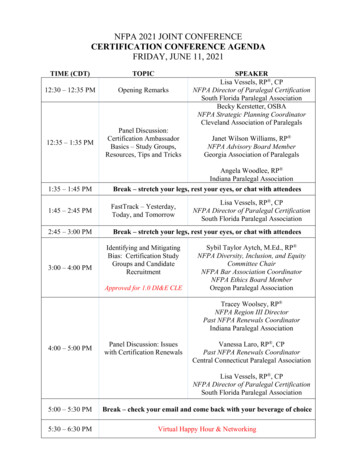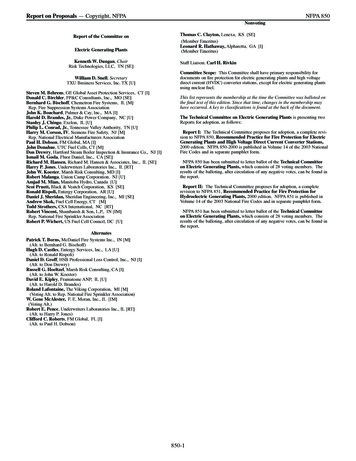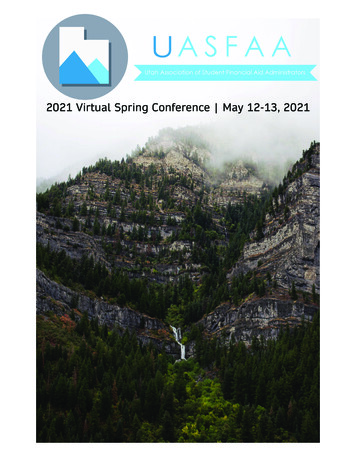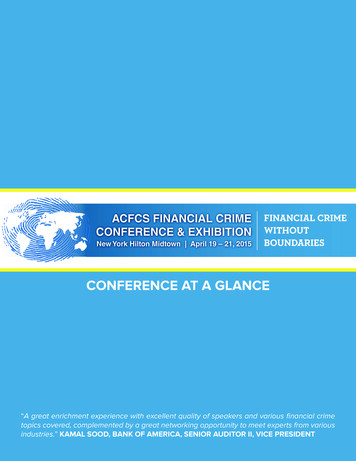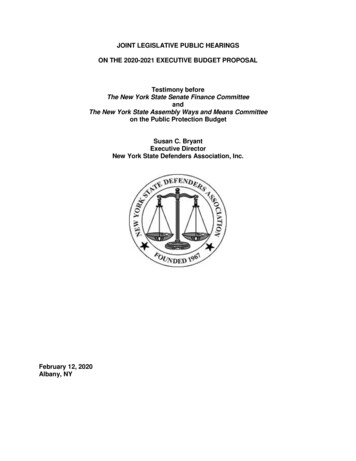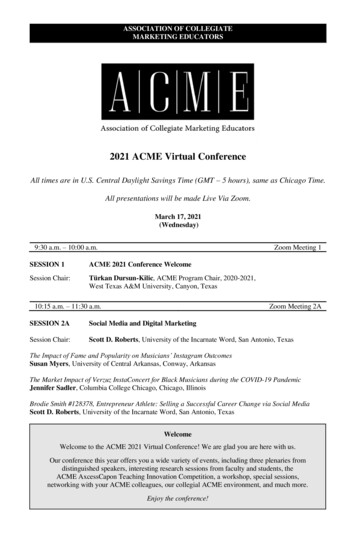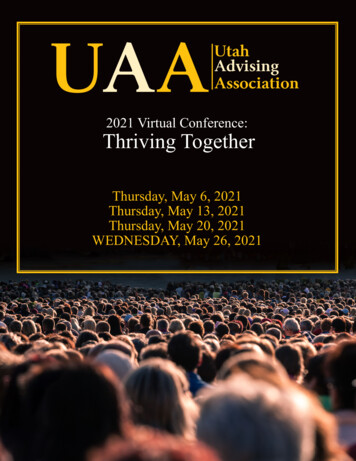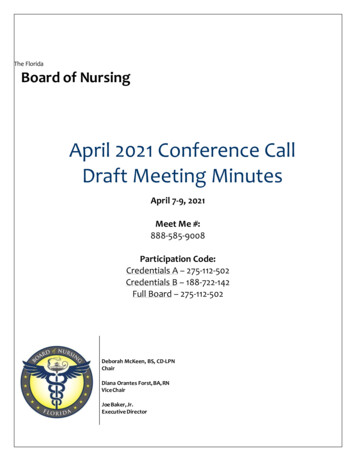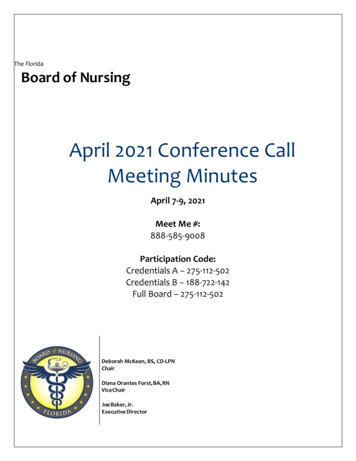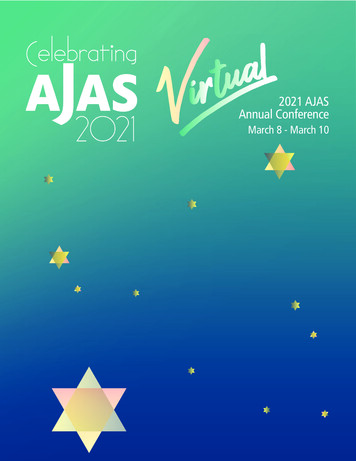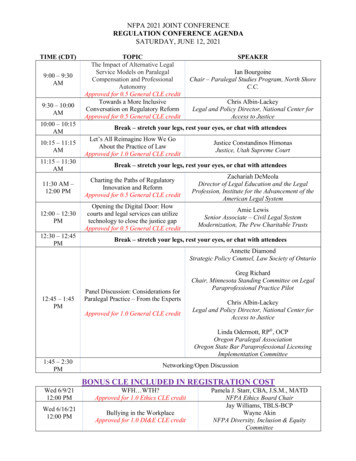
Transcription
NFPA 2021 JOINT CONFERENCEREGULATION CONFERENCE AGENDASATURDAY, JUNE 12, 2021TIME (CDT)9:00 – 9:30AM9:30 – 10:00AM10:00 – 10:15AM10:15 – 11:15AM11:15 – 11:30AMTOPICThe Impact of Alternative LegalService Models on ParalegalCompensation and ProfessionalAutonomyApproved for 0.5 General CLE creditTowards a More InclusiveConversation on Regulatory ReformApproved for 0.5 General CLE creditSPEAKERIan BourgoineChair – Paralegal Studies Program, North ShoreC.C.Chris Albin-LackeyLegal and Policy Director, National Center forAccess to JusticeBreak – stretch your legs, rest your eyes, or chat with attendeesLet’s All Reimagine How We GoAbout the Practice of LawApproved for 1.0 General CLE creditJustice Constandinos HimonasJustice, Utah Supreme CourtBreak – stretch your legs, rest your eyes, or chat with attendees11:30 AM –12:00 PMCharting the Paths of RegulatoryInnovation and ReformApproved for 0.5 General CLE creditZachariah DeMeolaDirector of Legal Education and the LegalProfession, Institute for the Advancement of theAmerican Legal System12:00 – 12:30PMOpening the Digital Door: Howcourts and legal services can utilizetechnology to close the justice gapApproved for 0.5 General CLE creditAmie LewisSenior Associate – Civil Legal SystemModernization, The Pew Charitable Trusts12:30 – 12:45PMBreak – stretch your legs, rest your eyes, or chat with attendeesAnnette DiamondStrategic Policy Counsel, Law Society of Ontario12:45 – 1:45PMPanel Discussion: Considerations forParalegal Practice – From the ExpertsApproved for 1.0 General CLE creditGreg RichardChair, Minnesota Standing Committee on LegalParaprofessional Practice PilotChris Albin-LackeyLegal and Policy Director, National Center forAccess to JusticeLinda Odermott, RP , OCPOregon Paralegal AssociationOregon State Bar Paraprofessional LicensingImplementation Committee1:45 – 2:30PMNetworking/Open DiscussionBONUS CLE INCLUDED IN REGISTRATION COSTWed 6/9/2112:00 PMWed 6/16/2112:00 PMWFH WTH?Approved for 1.0 Ethics CLE creditBullying in the WorkplaceApproved for 1.0 DI&E CLE creditPamela J. Starr, CBA, J.S.M., MATDNFPA Ethics Board ChairJay Williams, TBLS-BCPWayne AkinNFPA Diversity, Inclusion & EquityCommittee
The Impact of Alternative Legal Service Models on Paralegal Compensationand Professional AutonomySaturday, June 12, 2021, 9:00 a.m. CDTSeveral recent surveys suggest that paralegal job satisfaction is generally “high.” These surveys, however, mustbe juxtaposed with numerous paralegal experiences, albeit anecdotal, of long hours, high pressure, elevated stress,and a continuing lack of respect and autonomy in the legal industry. Informal calls for greater paralegalcompensation and autonomy have not resulted in widespread change. Moreover, when paralegals call forregulatory change, they have been defied by a current regulatory framework which both benefits lawyers andembodies their fears over greater paralegal autonomy and independence.This presentation addresses the potential impact of alternative service models on improving the workingconditions for paralegals. Specifically, paralegal licensing may harness market factors to increase paralegalemployment options, increase compensation, and provide all paralegals with the opportunity to garner greaterrespect, independence, and compensation options in the law office.Ian BourgoineChair, Paralegal Studies ProgramNorth Shore Community CollegeIan Bourgoine is the Chair of the Paralegal Studies Program at North ShoreCommunity College in Danvers, Massachusetts. Mr. Bourgoine is a current Doctorof Education student at the University of Memphis. He obtained his undergraduateand law degrees from the University of New Hampshire. Bourgoine has taught lawand paralegal studies at the undergraduate and law school levels for almost ten years.Prior to that, Mr. Bourgoine practiced management-side labor law and class actionlitigation throughout the United States. He is frequently invited to speak on legalissues related to legal technology and e-discovery, especially within the area of ediscovery project management in class action litigation.
Towards a More Inclusive Conversation on Regulatory ReformSaturday, June 12, 2021, 9:30 a.m. CDTMany states are reconsidering rules that bar non-lawyers from offering any kind of legal help to people who needit. Too often, though, the key policy discussions around these ideas have only lawyers in the room. In this sessionwe'll talk about why it's essential for any deliberations around regulatory reform to be driven not only by lawyersbut also by the paralegals, social workers, activists and others who stand ready to step into new legal servicesroles. We'll also talk about why it's been so difficult to make that happen-- and what we can learn from processeslike the one in Minnesota that have done better.As part of this conversation, we will introduce a new report by the National Center for Access to Justice thatdraws on more than 60 interviews with non-JDs who confront unmet legal needs on a daily basis. They are theparalegals, activists, social workers, librarians and others who stand ready to help people with their legal problemsif only the rules allow it. The report offers sharp and incisive perspectives on the kind of change we need. It alsohelps illustrate just how much we're missing when policy discussions around legal services reform exclude thepeople who should be empowered to do more.Chris Albin-LackeyLegal & Policy DirectorNational Center for Access to Justice at Fordham Law SchoolChris Albin-Lackey is NCAJ's Legal & Policy Director. He helps lead NCAJ's effortsto support reforms that empower people other than lawyers to help those in need oflegal services. He is also helping to develop the organization's work on abuses relatedto criminal fines and fees.Prior to joining NCAJ, Chris was Senior Legal Advisor with Human RightsWatch. He also worked for more than ten years as a Human Rights Watch researcher and associate director. Whileat HRW, he authored several reports focused on the abuse of disadvantaged litigants in the US justice system.These included Rubber Stamp Justice: US Courts, Debt Buying Corporations and the Poor and Profiting FromProbation: America’s Offender-Funded Probation Industry. Chris has a Bachelor of Arts in Public Policy fromBoston University and a JD from Columbia Law School.
Let’s All Reimagine How We Go About the Practice of LawSaturday, June 12, 2021, 10:15 a.m. CDTJustice Himonas will cover three main topics in his discussion on Utah’s reform efforts. This includes (1) theaccess-to-justice gap and the driving force behind Utah’s reform efforts; (2) a historical and theoretical overviewof Utah’s legal regulatory sandbox; and (3) what Utah has already seen and what they expect to see, as a result.Justice Constandinos HimonasUtah Supreme CourtJustice Deno Himonas is a Justice of the Utah Supreme Court. Prior to hisappointment to the Utah high court, he served as a trial court judge for many years.Justice Himonas earned a B.A. in economics from the University of Utah and a J.D.from the University of Chicago. Upon graduating law school, he returned to Utahand spent fifteen years working as a litigator, focusing on complex civil litigation.Justice Himonas has served as the chairperson of the litigation section of the UtahState Bar, the co-chair of the Third District Court’s pro bono committee, the co-chairof the Supreme Court’s working group and task force for regulatory reform, and a member of the Judicial ConductCommission. He currently serves on the Utah Judicial Council, as the chair of the Supreme Court’s committeefor licensed legal practitioners, and the chair of the Judicial Council’s task force on online dispute resolution. Heis also active in a number of national and international groups concerned with the administration of justice.Justice Himonas is deeply involved in access-to justice issues. He publishes on and can often be found speakingto local, national, and international audiences on the topic. At present, he is deeply involved in efforts to reimaginethe regulation of the practice of law in order to make it more affordable and more accessible to all.Justice Himonas has taught as an adjunct professor at the University of Utah S.J. Quinney College of Law andguest lectured at numerous law schools, including in Kiev, Ukraine, through the Leavitt Institute for InternationalDevelopment. He has been honored by the S.J. Quinney College of Law as an Honorary Alumnus of the Year; heis a recipient of the Rebuilding Justice Award from the Institute for the Advancement of the American LegalSystem and the Judicial Excellence Award from the Utah State Bar; and he is a Fellow of the National Conferenceof Technology and Dispute Resolution and a Life Fellow of the American Bar Association. Most recently, theAmerican Bar Association has honored Justice Himonas as a “Legal Rebel”.
Charting the Paths of Regulatory Innovation & ReformSaturday, June 12, 2021, 11:30 a.m. CDTThis presentation offers a survey of different regulatory innovation and reform efforts taking place right now inthe U.S., the problems they are designed to address, and the international background that has influenced someof these efforts. The presentation will include a summary of the current crisis in access to affordable legal services,areas of focus in different states for regulatory innovation, and where reform and innovation are happening now.It will also cover some of the important themes that have emerged in recent years, such as balancing flexibility inallowing for innovation in legal services with a traditional rule-based regulatory system, whether changes willpresent new risks to consumers or lead to less business for lawyers, and the importance of data analysis andevaluation.Zacharias DeMeolaDirector of Legal Education and the Legal ProfessionInstitute for the Advancement of the American Legal SystemZack DeMeola is the Director of Legal Education and the Legal Profession at theInstitute for the Advancement of the American Legal System (IAALS), a national,independent research center at the University of Denver dedicated to facilitatingcontinuous improvement and advancing excellence in the American legal system.At IAALS, he works to improve the delivery of legal services through a variety ofprojects that focus on education, licensing and admission into the profession, theintersection of law and technology, and the regulation of the legal profession. He iscurrently leading the IAALS Unlocking Legal Regulation Project, which supportsand facilitates efforts to improve the regulation of legal services in the United States.Mr. DeMeola joined IAALS in 2017 after having litigated in private practice for sixyears. He is a member of the Governing Council of the ABA Center for Innovation and a co-founder andorganizing member of the Denver Legal Hackers. He graduated from William & Mary School of Law, obtaineda Master’s degree in American Studies from the College of William and Mary, and received his B.A. from theUniversity of Pennsylvania.
Opening the Digital Door: How courts and legal services can utilize technologyto close the justice gapSaturday, June 12, 2021, 12:00 p.m. CDTTechnology companies are seizing new opportunities to disrupt the legal field. Investments in “legal tech” leaptby 715% between 2017-2018 and saw investments of 400 million in the first quarter of 2019 alone. Legal techmakes lawyers more efficient through the use of artificial technology in e-discovery and virtual attorneys andplaces solutions to legal problems at people’s fingertips. As legal tech explodes, courts are also getting into thegame. From e-filing, to electronic case management, to online dispute resolution, courts are finding creativeways to open up their digital doors.This session will explore the ways that civil legal aid agencies and courts are rapidly adopting technology,including shifts due to COVID-19, stakeholder engagement, and guiding principles for technology adoption.Amie LewisSenior Associate, Civil Legal System ModernizationThe Pew Charitable TrustsAmie is with The Pew Charitable Trusts’ Civil Legal System ModernizationProject, where she works to make the nation’s civil legal system more accessibleand affordable by implementing the most promising technologies and tools to assistself-represented litigants and improve state court efficiency. Formerly at EqualJustice Works, Amie managed cohorts of legal fellows and various private andfederal grants. At the Legal Resource Center on Violence Against Women, shetrained attorneys, judges, and court personnel and assisted DV survivors nationwidein obtaining legal representation. As a paralegal and a pro bono coordinator, Amieacquired a deep understanding of the civil legal system, including housing,consumer, probate, and family law. She also has experience working with nonprofits to develop systems, buildcommunity partnerships, and implement technology solutions to meet the needs of low-income individuals.Amie holds a B.A. in political science and an M.A. in women’s studies.
Panel Discussion: Considerations for Paralegal Practice – From the ExpertsSaturday, June 12, 2021, 12:45 p.m.Join Annette Diamond, Gregory Richard, Chris Albin-Lackey, and Linda Odermott for a discussion on limitedlicensing, expanded scope, and other measures using non-attorneys to bridge the access to justice gap. Leaningon their experience as regulators, and their research, the panelists will cover a broad variety of topics fromidentifying the need to establishing regulatory structures, evaluation of program participation, and ethicalconsiderations for states considering non-attorney practice.Annette DiamondStrategic Policy CounselLaw Society of OntarioAnnette is a seasoned lawyer, manager, and certified Project ManagementProfessional with 22 years of legal experience; 17 years in progressively moresenior roles in a regulatory environment, complemented with five years of teachingand litigation experience at both a national Bay street law firm and a small boutiquefirm.As Strategic Policy Counsel with the Law Society of Ontario, Annette is leading thedevelopment of the family legal services license, the first of its kind in Canada, for paralegals and others to provideservices in family law. Annette previously led the expansion and rebranding of the Law Society Referral Serviceto include online services, the addition of paralegals, and referrals to community resources. Annette has alsocontributed to key policy initiatives including paralegal regulation, mandatory continuing professionaldevelopment, practice locums, alternative business structures, and file retention guidelines.Prior to joining the Law Society in 2004, Annette practised in civil litigation, family law, and estates law at botha boutique law firm and a large national law firm. Annette represented charities, not-for-profit corporations,international corporations, private individuals, and government agencies. Annette has acted as counsel at all levelsof court in Ontario and at various alternative dispute resolution forums.Annette developed the course curricula and taught two general interest legal courses for five years for the TorontoDistrict School Board. She has promoted and contributed to legal education through numerous publications,presentations, and conferences.Annette received a Bachelor of Arts (Psychology) at the University of Western Ontario in 1995, a Bachelor ofLaw (LL.B.) from Osgoode Hall in 1998, an Executive Certificate in Conflict Management from Stitt Feld HandyGroup, Faculty of Law, University of Windsor in 2016, a Masters Certificate in Project Management, SchulichSchool of Business, Executive Education Centre, York University in 2019 and was certified as a ProjectManagement Professional in 2020 by the Project Management Institution. She was called to the Bar in Ontario in2000.Annette volunteers as a coach and judge for mock trials for the Ontario Justice Education Network and the OntarioBar Association, and as a tour guide for the historical building of Osgoode Hall. Annette is active in thecommunity as a board member for a local childcare centre, a parent volunteer for her children’s school, and acanvasser for the Heart and Stroke Foundation.
Gregory RichardAssistant Professor of History & Legal StudiesWinona State UniversityBA, MA, University of Louisiana at LafayetteJD, BCL, Louisiana State UniversityPhD, University of MississippiBorn and raised in Louisiana, Dr. Richard earned a B.A. and M.A. degrees from theUniversity of Louisiana at Lafayette. In addition, he earned his Juris Doctor andBachelor of Civil Law from Louisiana State University and a Ph.D. in history from the University of Mississippi.He is currently the director of the Legal Studies Program at Winona State University in Winona, MN. He currentlyserves as chairperson for the Minnesota Legal Paraprofessional Pilot Program. After considerable planning, hardwork, and dedication from the committee, the pilot program launched in March 2021.Linda Odermott, RP , OCPOregon Paralegal AssociationOregon State Bar Paraprofessional Licensing ImplementationCommitteeLinda Odermott, RP , OCP is the lead paralegal and officeadministrator for the Rosen Law Firm, P.C. in Portland,Oregon. Linda has worked as a paralegal on complex litigationmatters since 2007, developing an expertise in civil litigation instate and federal courts, administrative rules, real estatetransactions, Superfund litigation, land use applications, public records & public meeting laws, and documentproduction & management.Her skills are nationally recognized. Linda is a regular panelist, facilitator and speaker at local and nationalparalegal conferences, attorney CLEs, and military courses, where she presents on real property matters, ethics,paralegal certification, paralegals in our Armed Forces, and the new paralegal licensure programs sprouting upacross the U.S. For more than six years, she has worked in coordination with the JAG offices of the variousbranches of the U.S. Military and the Judge Advocate General’s Association of Paraprofessionals to assist activeduty, retired and civilian contract paralegals of the various sister services obtain paralegal certifications to assistwith postmilitary, civilian careers.Linda is a current a member of the Oregon State Bar Paraprofessional Licensing Implementation Committee(PLIC), where she chairs the Admissions and Education Workgroup. The PLIC focuses on drafting theimplementation rules to license paraprofessionals to address the state’s access to justice gap. Linda is also amember of the adjunct faculty at Portland Community College’s Paralegal Program.
WFH WTH?Wednesday, June 9, 2021, 12:00 p.m. CTWFH – what could possibly go wrong? In the time of COVID, WFH became the norm. Firms that balked atflexible schedules and working remotely found themselves with two options, adapt or shutdown. Even the courtstransformed. Such transitions come at a cost – financial, physical, emotional, and yes, even ethical. No longershielded by the four walls of their offices, legal professionals risk committing unintentional ethical violations.Join us as Pamela draws from her personal experience as a virtual/freelance paralegal and the ABA’s Model Rulesof Professional Conduct and Model Guidelines for the Utilization of Paralegal Services, and NFPA’s ModelDisciplinary Rules and Ethical Considerations to examine the ethical challenges and dilemmas faced by WFHlegal professionals.How does WFH impact our personal and professional integrity and professional conduct? Are confidentiality andsecurity being adequately preserved? Does WFH increase the probability of conflicts of interest? Are paralegalsreceiving proper supervision, or does WFH blur the line for UPL?Pamela J. Starr, CBA, J.S.M., MATDEthics Board ChairNational Federation of Paralegal Associations, Inc.When her 25-year BigLaw career as a bankruptcy and creditors’ rights paralegalcame to
Service Models on Paralegal Compensation and Professional Autonomy Approved for 0.5 General CLE credit Ian Bourgoine Chair – Paralegal Studies Program, North Shore C.C. 9:30 – 10:00 AM Towards a More Inclusive Conversation on Regulatory Reform Approved for 0.5 General CLE credit Chris Al
